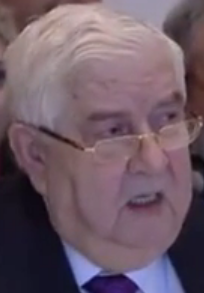
Update, 8 Jan 2014: Nowhere in the Australian mainstream print or broadcast media is Walid Al-Moallem's speech printed, or even adequately paraphrased.
Like the (mis)reporting in all the Australian msm, the stories in the Fairfax Sydney Morning Herald, linked to below, fail to report anywhere the Foreign Minister's insistence that the Syrian people, and not the Geneva 2 Conference attendees, decide at an election whether or not Bashar al-Assad remain as President of Syria: Syria's Foreign Minister clashes with UN Secretary General Ban Ki-moon at peace conference, Fiery exchanges over Assad's fate at talks, Syrian peace talks degenerate into acrimony, After angry opening, Syrian regime holds out hope for talks, Syria to allow women and children to leave besieged city.
In his opening address to the Geneva 2 Peace conference on 22 January 2014, published by SANA, Syrian Foreign Minister Walid Al-Moallem gave a comprehensive account of the terrorist war of aggression that has, according to some estimates, cost Syria 100,000 lives in almost three years since March 2011. His speech named other conference attendees, including the United States, Israel and the Arab dictatorships of Qatar and Saudi Arabia as the principle perpetrators of these crimes. This speech was also published on Global Research on 22 Jan 2013.The address by Secretary of State, John Kerry, which contains a number of known falsehoods, is also included as an Appendix for comparison with Walid Moallem's speech. The original can be found on the U.S. Secretary of State's web-site. |

Update, 27 Jan 2014: Debate about Geneva 2 Conference from TARPLEY.net embedded as Appendix 3.
|
|
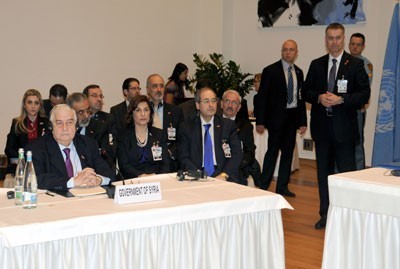
Montruex, (SANA) - The international conference on Syria, Geneva2, kicked off on Wednesday morning with the participation of Syria's official delegation, headed by Deputy Premier, Foreign and Expatriates Minister, Walid al-Moallem.
Minister al-Moallem said at the opening session of the conference:
Ladies and Gentlemen,On behalf of the Syrian Arab Republic,SYRIAN – steeped in history for seven thousand years.ARAB – proud of its steadfast pan-Arab heritage despite the deliberate acts of aggression of supposed brotherly Arabs.REPUBLIC – a civil state that some, sitting in this room, have tried to return to medieval times.Never have I been in a more difficult position; my delegation and I carry the weight of three years of hardship endured by my fellow countrymen - the blood of our martyrs, the tears of our bereaved, the anguish of families waiting for news of a loved one - kidnapped or missing, the cries of our children whose tender fingers were the targets of mortar shelling into their classrooms, the hopes of an entire generation destroyed before their very eyes, the courage of mothers and fathers who have sent all their sons to defend our country, the heartbreak of families whose homes have been destroyed and are now displaced or refugees.
Al-Moallem: My delegation and I carry the hope of a nation for the years to come
My delegation and I also carry the hope of a nation for the years to come – the right of every child to safely go to school again, the right of women to leave their homes without fear of being kidnapped, killed or raped; the dream of our youth to fulfill their vast potential; the return of security so that every man can leave his family safe in the knowledge that he will return.
Finally, today, the moment of truth; the truth that many have systematically tried to bury in a series of campaigns of misinformation, deception and fabrication leading to killing and terror. A truth that refused to be buried, a truth clear for all to see – the delegation of the Syrian Arab Republic representing the Syrian people, the government, the state, the Army and the President - Bashar al-Assad.
It is regrettable that seated amongst us are representatives of countries that have the blood of Syrians on their hands
It is regrettable, Ladies and Gentlemen, that seated amongst us today in this room, are representatives of countries that have the blood of Syrians on their hands, countries that have exported terrorism along with clemency for the perpetrators, as if it was their God given right to determine who will go to heaven and who will go to hell. Countries that have prevented believers from visiting holy places of worship whilst abetting, financing and supporting terrorists. Countries that gave themselves the authority to grant and deny legitimacy to others as they saw fit, never looking at their own archaic glasshouses before throwing stones at acclaimed fortified towers. Countries that shamelessly lecture us in democracy, in development and in progress whilst drowning in their own ignorance and medieval norms. Countries that have become accustomed to being entirely owned by kings and princes who have the sole right to distribute their national wealth granting their associates whilst denying those who fall out of favor.
They lectured Syria – a distinguished, virtuous, sovereign state, they lectured her on honour whilst they themselves were immersed in the mud of enslavement, infanticide and other medieval practices. After all their efforts and subsequent failures, their masks fell from their quivering faces, to reveal their perverse ambitions. A desire to destabilize and destroy Syria by exporting their national product: terrorism. They used their petrodollars to buy weapons, recruit mercenaries and saturate airtime covering up their mindless brutality with lies under the guise of the so-called " Syrian revolution that will fulfill the aspirations of the Syrian people."
Ladies and Gentlemen, how is what has happened and continues to plague Syria, meeting these aspirations? How can a Chechen, Afghani, Saudi, Turkish or even French and English terrorists deliver on the aspirations of the Syrian people, and with what? An Islamic state that knows nothing of Islam except perverse Wahhabism? Who declared anyway that the Syrian people aspire to live thousands of years in the past?
In Syria, the wombs of pregnant women are butchered and their foetuses killed
In Syria, Ladies and Gentlemen, the wombs of pregnant women are butchered and their foetuses killed; women are raped, dead or alive, in practices so heinous, so vile and repulsive that they can only be attributed to their perverse doctrine. In Syria, Ladies and Gentlemen, men are slaughtered in front of their children in the name of this revolution; worse still, this is done whilst the children of these foreign perpetrators sing and dance. In Syria, how can so-called revolutionaries cannibalize a man's heart and claim to promote freedom, democracy and a better life?
Under the pretext of the "Great Syrian Revolution," civilians, clergymen, women and children are killed, victims are indiscriminately blown up in streets and buildings regardless of their political views or ideologies; books and libraries are burned, graves are dug up and artifacts stolen. In the name of the revolution, children are killed in their schools and students in their universities, women are extorted in the name of jihad al-nikah and other forms, mosques are shelled whilst worshipers kneel at prayer, heads are severed and hung in the streets, people are burned alive in a true holocaust that history and many countries will deny without being accused of anti-Semitism.
In the name of a revolution, "to free the oppressed Syrian people from the regime and to spread democracy," does a father blow himself up with his wife and children to prevent foreign intruders from entering his home? Most of us in this room are fathers - I ask you then, what would compel a man to kill his own family to protect them from freedom fighting monsters. This is what happened in Adra, a place that most of you have not heard of but where the same alien monsters attacked: killing, looting, beheading, slaughtering, raping and burning people alive. You have heard nothing of this brutality for sure, yet you have heard of other places where the same heinous crimes were committed and where the same blood soaked finger was pointed at the Syrian Army and government. And when these flagrant lies were no longer credible, they stopped spinning their web of deceit.
This is what their masters ordered them to do, these countries that spearheaded the war against Syria, trying to increase their influence in the region with bribes and money, exporting human monsters fully soaked in abhorrent Wahabi ideology, all at the expense of Syrian blood. From this stage, loud and clear, you know as well as I do that they will not stop in Syria, even if some sitting in this room refuse to acknowledge or consider themselves immune.
Ladies and Gentlemen, everything you have heard would not have been possible, had our border sharing countries been good neighbours during these challenging years. Unfortunately they were far from it; with backstabbers to the North, silent bystanders to the truth in the West, a weak South accustomed to doing the bidding of others, or the tired and exhausted East still reeling from the plots to destroy it along with Syria.
Mimsery and destruction, wich has engulfed Syria, has been made possible by the decision of Erdogan's government
Indeed, this misery and destruction, wich has engulfed Syria, has been made possible by the decision of Erdogan's government to invite and host these criminal terrorists before they entered into Syria. Clearly, oblivious to the fact that magic eventually turns on the magician, it is now beginning to taste the sour seed it has sown. For terrorism knows no religion, and is loyal only unto itself. Erdogan's government has recklessly morphed from a zero problems with its neighbours policy to zero foreign policy and international diplomacy altogether, crucially leaving it with zero credibility.
Nevertheless, it continued on the same atrocious path falsely believing that the dream of Sayyid Qutb and Mohammad Abdel Wahab before him was finally being realized. They wreaked havoc from Tunisia, to Libya, to Egypt and then to Syria, determined to achieve an illusion that only exists in their sick minds. Despite the fact that it has proven to be a failure, they nevertheless are still determined to pursue it. Logically speaking, this can only be described as stupidity, because if you don't learn from history, you will lose sight of the present; and history tells us: if your neighbor's house is on fire, it is impossible for you to remain safe.
Some neighbours started fires within Syria whilst others recruited terrorists from around the globe – and here we are confronted with shockingly farcical double standards: 83 nationalities are fighting in Syria - nobody denounces this, nobody condemns it, nobody reconsiders their position - and they impertinently continue to call it a glorious SYRIAN Revolution! While when a few scores of young resistant fighters supported the Syrian Army in a few places, all hell broke loose and it suddenly became foreign intervention! Demands were made for the departure of foreign troops and the protection of Syrian sovereignty and for it not to be violated. Here I affirm, Syria - the sovereign and independent state, will continue to do whatever it takes to defend herself with whatever means it deems necessary, without paying the least bit of attention to any uproar, denunciations, statements or positions expressed by others. These have been and always will be Syria's sovereign decisions.
They imposed sanctions on our food, our bread and our children's milk
Despite all of this, the Syrian people remained steadfast; and the response was to impose sanctions on our food, our bread and our children's milk. To starve the population, pushing them into sickness and death under the injustice of these sanctions. At the same time, factories were looted and burned, crippling our food and pharmaceutical industries; hospitals and healthcare centers were destroyed; our railroads and electricity lines sabotaged, and even our places of worship - Christian and Muslim – were not spared their terrorism.
When all of this failed, America threatened to strike Syria, fabricating with her allies, Western and Arab, the story about the use of chemical weapons, which failed to convince even their own public, let alone ours. Countries that celebrate democracy, freedom and human rights regrettably only choose to speak the language of blood, war, colonialism and hegemony. Democracy is imposed with fire, freedom with warplanes and human rights by human killing, because they have become accustomed to the world doing their bidding: if they want something, it will happen; if they don't, it won't. They have heedlessly forgotten that the perpetrators who blew themselves up in New York follow the same doctrine and come from the same source as those blowing themselves up in Syria. They have heedlessly forgotten that the terrorist that was in America yesterday is in Syria today, and who knows where he will be tomorrow. What is certain, however, is that he will not stop here. Afghanistan is an ideal lesson for anyone who wants to learn – anyone! Unfortunately, most do not want to learn; neither America nor some of the ‘civilized' western countries that follow its lead, starting from the city of lights to the kingdom over which "the sun never set," in the past; despite the fact that they have all felt the bitter taste of terrorism in the past.
And then suddenly they became "Friends of Syria." Four of these ‘friends' are autocratic, oppressive monarchies that know nothing of a civil state or democracy, whilst others are the same colonial powers which occupied, pillaged and partitioned Syria less than one hundred years ago. These so called ‘friends' are now convening conferences to publicly declare their friendship with the Syrian people, whilst covertly facilitating their hardship and destroying their livelihoods. They openly express their outrage over the humanitarian plight of Syrians whilst deceiving the international community of their complicity. If you were truly concerned about the humanitarian situation in Syria, you would remove your strangle hold on her economy by lifting the sanctions and the embargo, and by partnering with her government in tightening security by fighting the influx of weapons and terrorists. Only then can we assure you that we will be well as we once were, without your deep concern for our wellbeing.
Some of you may be asking yourselves: Are foreigners the sole manufacturers of the happenings in Syria? No Ladies and Gentlemen, Syrians amongst us here, having been legitimized by foreign agendas, have played a contributing role as facilitators and implementers. They did this at the expense of Syrian blood and the people whose aspirations they claim to represent, whilst they themselves were divided hundreds of times and their leaders on the ground were fleeing far and wide. They sold themselves to Israel becoming her eyes on the ground, and her fingers on the trigger for Syria's destruction; and when they failed, Israel intervened directly to reduce the capabilities of the Syrian Army and thus ensuring the continued implementation of her decades old plan for Syria.
Our people were being slaughtered while opposition figures legitimized by foreign agendas were living in five star hotels
Our people were being slaughtered while they were living in five star hotels; they opposed from abroad, met abroad betraying Syria and selling themselves to the highest foreign bidder. And yet, they still claim to speak in the name of the Syrian people! No, Ladies and Gentlemen, anyone wishing to speak on behalf of the Syrian people cannot be a traitor to their cause and an agent for their enemies. Those wishing to speak on behalf of the people of Syria should do so from within her borders: living in her destroyed houses, sending their children to her schools in the morning not knowing if they will return safe from mortar shelling, tolerating the freezing cold winters because of the shortage in heating oil and queuing for hours to buy bread for their families because sanctions have prevented us from importing wheat when we were once exporters. Anyone wanting to speak in the name of the Syrian people should first endure three years of terrorism, confronting it head on, and then come here and speak on behalf of the Syrian people.
Syria has welcomed hundreds of international journalists and facilitated their mobility
Ladies and gentlemen,
the Syrian Arab Republic – people and state, has fulfilled its duties. It has welcomed hundreds of international journalists and facilitated their mobility, security and access; and they in turn have reflected the stark and horrific realities they witnessed to their audiences, realities that have perplexed many Western media organisations who couldn't bear their propaganda and narrative being exposed and contradicted. The examples are too many to count. We allowed international aid and relief organizations into the country, but the clandestine agents of certain parties sitting here, obstructed them from reaching those in dire need of aid. They came under terrorist attack several times, whilst we, as a state, did our duty in protecting them and facilitating their work. We issued numerous amnesties and released thousands of prisoners, some even members of armed groups, at the anger and dismay of their victim's families; these families though, like the rest of us, ultimately accepted that Syria's interests come before anything else, and hence we must conceal our wounds and rise above hatred and rancor.
What have you done, you who claim to speak on behalf of the Syrian people. Where is your vision for this great country? Where are your ideas or your political manifesto? Who are your agents of change on the ground other than your armed criminal gangs? I am certain that you have nothing and this is only too apparent in the areas that your mercenaries have occupied or to use your words "liberated."
In these areas, have you freed the population or have you hijacked their moderate culture to enforce your radical and oppressive practices? Have you implemented your development agenda by building schools and health centres? No, you have destroyed them and allowed polio to return after it had previously been eradicated in Syria. Have you protected Syria's artifacts and museums? No, you have looted our national sites for your personal profit. Have you demonstrated your commitment to justice and human rights? No, you have enforced public executions and beheadings. In short, you have done nothing at all except muster the disgrace and shame of begging America to strike Syria. Even the opposition, over which you are the self-appointed masters and guardians, do not acknowledge you or the methods in which you manage your own affairs, let alone the affairs of a country.
A country they want to homogenize; not in the sectarian, ethnic or religious sense, but rather in a warped ideological sense. Anyone against them, whether Christian or Muslim, is an infidel; they killed Muslims of all sects and targeted Syrian Christians with severity. Even nuns and bishops were targeted, kidnapping them after they attacked Ma'loula, the last community that still speaks the language of Jesus Christ. They did all this to force Syrian Christians to flee their country. But little did they know, that in Syria we are one. When Christianity is attacked all Syrians are Christians, when mosques are targeted all Syrians are Muslims. Every Syrian is from Raqqa, Lattakia, Sweida, Homs or the bleeding Aleppo when any one of these places is targeted. Their abhorrent attempts to sow sectarian and religious sedition will never be embraced by any levelheaded Syrian. In short, Ladies and Gentlemen, your "glorious Syrian revolution" has left no mortal sin uncommitted.
There is another side to this dark gloomy picture. A light at the end of the tunnel shinning through the Syrian people's determination and steadfastness, the Syrian Army's courage in protecting our citizens and the Syrian state's resilience and perseverance. During everything that has happened, there are states that have shown us true friendship, honest states that stood on the side of right against wrong, even when the wrong was clear for all to see. On behalf of the Syrian people and state, I would like to thank Russia and China for respecting Syria's sovereignty and independence. Russia has been a true champion on the international stage strongly defending, not only with words but also with deeds, the founding principles of the United Nations of respecting the sovereignty of states. Similarly China, the BRICS countries, Iran, Iraq and other Arab and Muslim countries, in addition to African and Latin American countries, have also genuinely safeguarded the aspirations of the Syrian people and not the ambitions of other governments for Syria.
The Syrian people, like other people of the region, aspire to more freedom, justice and human rights
Yes, Ladies and Gentlemen, the Syrian people, like other people of the region, aspire to more freedom, justice and human rights; they aspire to more plurality and democracy, to a better Syria, a safe, prosperous and healthy Syria. They aspire to building strong institutions not destroying them, to safeguarding our national artifacts and heritage sites not looting and demolishing them. They aspire to a strong national army, which protects our honour, our people and our national wealth, an army that defends Syria's borders, her sovereignty and independence. They do not, Ladies and Gentlemen, aspire to a mercenary army ‘Free' to kidnap civilians for ransom or to use them as human shields, ‘Free' to steal humanitarian aid, extort the poor and illegally trade in the organs of living women and children, ‘Free' to canibalise human hearts and livers, barbequing heads, recruiting child soldiers and raping women. All of this is done with the might of arms; arms provided by countries, represented here, who claim to be championing "moderate groups". Tell us, for God's sake, where is the moderation in everything I have described?
Where are these vague moderate groups that you are hiding behind? Are they the same old groups that continue to be supported militarily and publicly by the West, that have undergone an even uglier face-lift in the hope of convincing us that they are fighting terrorism? We all know that no matter how hard their propaganda machine tries to polish their image under the name of moderation, their extremism and terrorism is one and the same. They know, as we all do, that under the pretext of supporting these groups, al-Qaeda and its affiliates are being armed in Syria, Iraq and other countries in the region.
This is the reality, Ladies and Gentlemen, so wake up to the undeniable reality that the West is supporting some Arab countries to supply lethal weapons to al-Qaeda. The West publically claims to be fighting terrorism, whilst in fact it is covertly nourishing it. Anyone who cannot see this truth is either ignorantly blind or willfully so in order to finish what they have begun.
Is this the Syria that you want? The loss of thousands of martyrs and our once cherished safety and national security replaced with apocalyptic devastation. Are these the aspirations of the Syrian people that you wanted to fulfill? No, Ladies and Gentlemen, Syria will not remain so, and that is why we are here. Despite all that has been done by some, we have come to save Syria: to stop the beheadings, to stop the cannibalizing and the butchering. We have come to help mothers and children return to the homes they were driven out of by terrorists. We have come to protect the civil and open-minded nature of the state, to stop the march of the Tatars and the Mongols across our region. We have come to prevent the collapse of the entire Middle East, to protect civilization, culture and diversity, and to preserve the dialogue of civilizations in the birthplace of religions. We have come to protect tolerant Islam that has been distorted, and to protect the Christians of the Levant. We are here to tell our Syrian expatriates, to return to their home country because they will always be foreigners anywhere else, and regardless of our differences we are all still brothers and sisters.
We have come to stop terrorism as other countries that have experienced its bitter taste have done, whilst affirming loudly and consistently that a dialogue between Syrians is the only solution; but as with other countries that have been struck by terrorism, we have a constitutional duty to defend our citizens and we shall continue to strike terrorism that attacks Syrians regardless of their political affiliations. We have come to hold those accountable, for as long as particular countries continue to support terrorism, this conference will bear no fruit. Political pluralism and terrorism cannot coexist in the same landscape. Politics can only prosper by fighting terrorism; it cannot grow in its shadow.
We are here as representatives of the Syrian people and the state; but let it be clear to all, – and experience is the best proof – that nobody has the authority to grant or withdraw legitimacy from a president, a government, a constitution, a law or anything else in Syria except Syrians themselves; this is their constitutional right and duty. Therefore, whatever agreement is reached here will be subject to a national referendum. We are tasked with conveying our people's desires, not with determining their destiny; those who want to listen to the will of the Syrian people should not appoint themselves as their spokesperson. Syrians alone have the right to choose their government, their parliament and their constitution; everything else is just talk and has no significance.
Finally, to all those here and everyone watching around the world: in Syria we are fighting terrorism, terrorism which has destroyed and continues to destroy; terrorism which since the 1980's Syria has been calling, on deaf ears, for a unified front to defeat it. Terrorism has struck in America, France, Britain, Russia, Iraq, Afghanistan, Pakistan; the list goes on and it continues to spread. Let us all cooperate to fight it, let's work hand in hand to stop its black, horrifying and obscurantist ideology. Then, let us as Syrians stand united to focus on Syria and start rebuilding its social fabric and material structures. As I said, dialogue is the foundation to this process, and despite our gratitude to the host country, we affirm that the real dialogue between Syrians should in fact be on Syrian soil and under Syrian skies. Exactly one year ago, the Syrian government put forward its vision for a political solution; think of how much innocent blood we would have saved had some countries resorted to reason instead of terrorism and destruction. For a whole year, we have been calling for dialogue, but terrorism continued to strike at the Syrian state, her people and institutions.
Today, in this gathering of Arab and Western powers, we are presented with a simple choice: we can choose to fight terrorism and extremism together and to start a new political process, or you can continue to support terrorism in Syria. Let us reject and isolate the black hands and the false faces, which publicly smile but covertly feed terrorist ideology, striking Syria today, but ultimately spreading to infect us all. This is the moment of truth and destiny; let us rise to the challenge.
Thank you
Editorial comment : This speech contains a number of falsehoods of which Jon Kerry cannot be unaware. Readers, who are informed about the Syrian conflict will be able to spot most of them. It is included so that readers can compare for themselves the fraudulent case against Syria put by the likes of John Kerry and the presstitute media with the facts included above and elsewhere. We will endeavour to footnote the lies. -&nbdp;Ed
Thank you very much, Secretary Ban, and thank you, Ambassador Brahimi, for your commitment to helping the Syrian people find a new future. And I join with Foreign Minister Lavrov in thanking all of the countries around the table, all of the groups around the table. I thank President Burkhalter and the people of Switzerland for making this important meeting possible. And I thank the Russian Federation and Foreign Minister Lavrov for his cooperation and efforts together with us, working to try to initiate this process. I also want to welcome the leaders of the Syrian opposition, and I thank them for the courageous decision they've made. Everybody here knows the pressures that have existed.
Today is a beginning. It's a beginning of what will obviously be a tough and complicated negotiation; peace talks to end a war and to end a struggle like this always are tough. Frankly, this is a test for all of us who support the Syrian people in their effort to end the extraordinary suffering that the world has witnessed, and which continues. And it is a test of the global community's ability to come together and ultimately secure a Syria where people can live in dignity and not in fear.
I want to start by saying that I think it is impressive, I think it is significant in and of itself, that so many countries have come together, even though we know it's for one day that all the countries will be here in this forum. But all of them have come together because everybody understands how critical it is for the world to prove that we have the ability to make a difference in this kind of a conflict.
Now, lost in the daily reports of violence is the fact that this revolution did not begin as an armed resistance. This started peacefully. It was started by schoolboys in Daraa who are armed only with graffiti cans, citizens who were peacefully and legitimately calling for change. And they were met almost immediately with violence. When their parents came out to protest the arrest of the children, 120 people died. That was the beginning.
And tragically, the Assad regime answered peaceful demonstration after peaceful demonstration with ever-increasing force. In the three years since then, this conflict has now left more than 130,000 dead, and it's hard to count accurately. We all know that. The fact is that these people have been killed by guns, by tanks, by artillery, by gas, by barrel bombs, by Scud missiles. They've been killed by weapons almost exclusively of the magnitude not possessed by the opposition. Starvation has been used as a weapon of war. And most recently, we have seen horrific reports of systematic torture and execution of thousands of prisoners. This is an appalling assault, not only on human lives, but on human dignity and on every standard by which the international community tries to organize itself, recognizing the horrors of the humanitarian catastrophe that has unfolded, the destabilization of neighboring countries, and the endless exile of refugees.
As a result, the international community came together 18 months ago to support the Syrian people as they sought to change course. Now, this has taken a lot longer than many of us wanted to bring everyone together. But we have come here determined as ever to implement the Geneva communique. Sergey Lavrov just mentioned the Geneva communique; I reiterate the Geneva communique. And the Geneva communique can only be implemented through the concerted efforts of everybody in this room. Millions of people are relying on the international community's ability to help find a solution that can save their lives and their country. And we see only one option: a negotiated transition government formed by mutual consent.
Now, we need to deal with reality here. We really need to deal with reality. Mutual consent, which is what has brought us here, for a transition government means that that government cannot be formed with someone that is objected to by one side or the other. That means that Bashar Assad will not be part of that transition government. There is no way – no way possible in the imagination – that the man who has led the brutal response to his own people could regain the legitimacy to govern. One man and those who have supported him can no longer hold an entire nation and a region hostage. The right to lead a country does not come from torture, nor barrel bombs, nor Scud missiles. It comes from the consent of the people. And it's hard to imagine how that consent could be forthcoming at this point in time.
So just as there could be no place for the perpetrator of this violence, there could also be no place for the thousands of violent extremists who spread their hateful ideology and worsen the suffering of the Syrian people. And as we hear talk about terrorism today, make no mistake: It is the presence of the current intransigence within the existing government that makes this problem worse. That is creating a magnet for terrorists. And until a transition takes place, there is no prayer of reducing the increase of terrorism.
There is another way forward. We all know it. It is what this conference is organized around. It is the Geneva communique, which has the support of the international community as a peaceful roadmap for transition. And the only thing standing in its way is the stubborn clinging to power of one man, one family. I believe the alternative vision of the Syrian people is one that can gather the respect and support of people all around the world. It is a place that doesn't force people to flee or live in fear, a Syria that protects the rights of every group. We have not only an opportunity, but we have an obligation to find a way forward so that the people of Syria can choose their leadership, know peace, and for 9 million refugees, finally be able to return home in dignity.


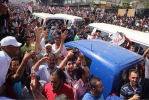
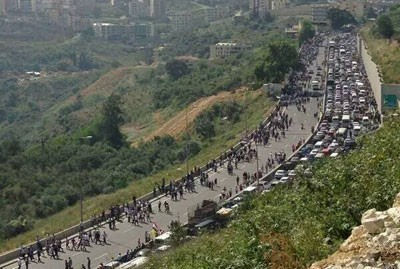 The remarkably high voter turnout in Lebanon grabbed headlines, with the Lebanese dailies publishing thorough analyses and opinion articles and TV channels hosting talking heads and pundits to elaborate on the event. Furthermore, the images of the huge crowds of Syrians went viral.
The remarkably high voter turnout in Lebanon grabbed headlines, with the Lebanese dailies publishing thorough analyses and opinion articles and TV channels hosting talking heads and pundits to elaborate on the event. Furthermore, the images of the huge crowds of Syrians went viral.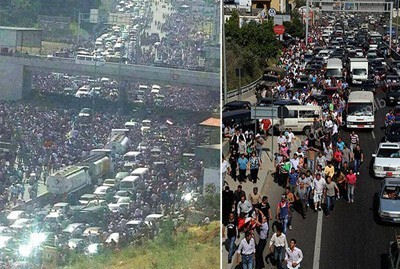
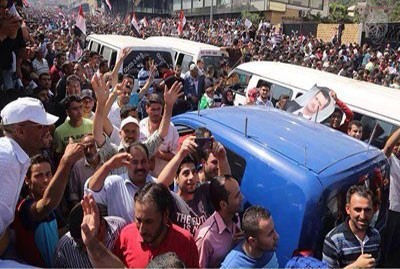
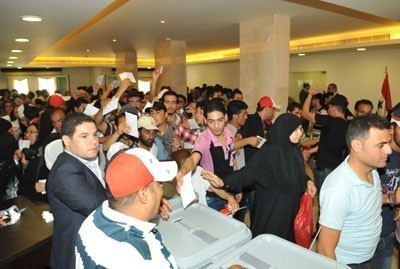
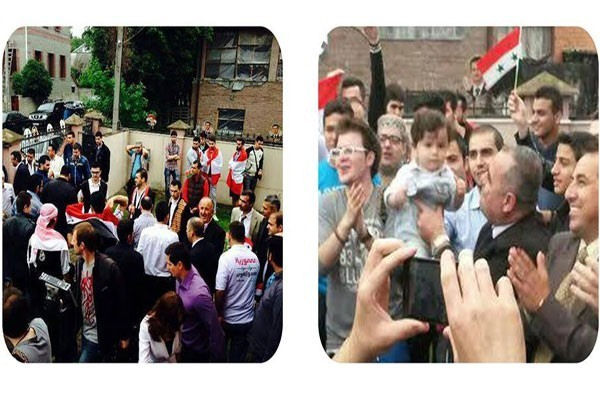
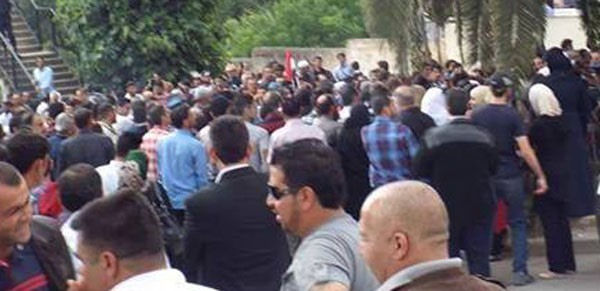
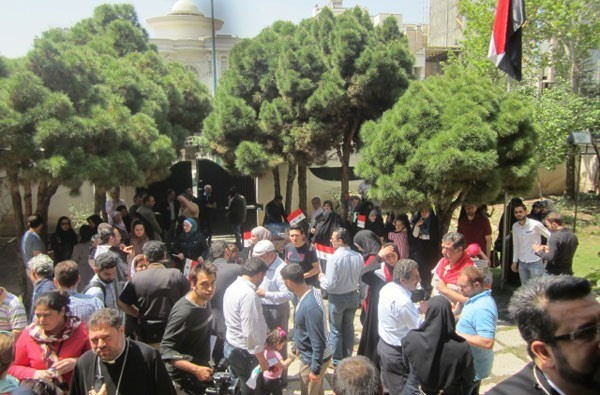
 It is perhaps now time for the ABC to stop pussyfooting around with the current government and simply passing on the criminal propaganda from Turkey and the Western powers with whom we are allied. It seems there has been a concerted effort by Western agencies and complicit media organisations to suppress results of investigations on use of sarin gas (chemical warfare) in Syria. Conclusions must be drawn which condemn those Western governments most closely involved in assisting the armed insurgency against the Syrian state, and the enormous destruction of property and lives that has resulted from it.
It is perhaps now time for the ABC to stop pussyfooting around with the current government and simply passing on the criminal propaganda from Turkey and the Western powers with whom we are allied. It seems there has been a concerted effort by Western agencies and complicit media organisations to suppress results of investigations on use of sarin gas (chemical warfare) in Syria. Conclusions must be drawn which condemn those Western governments most closely involved in assisting the armed insurgency against the Syrian state, and the enormous destruction of property and lives that has resulted from it.
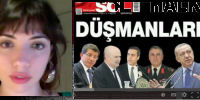 While mainstream press is only reporting that Turkey's Prime Minister Recep Tayyip Erdogan, blocked twitter, the reason he did so goes unreported. Yet that is the most interesting and shocking thing: A leaked conversation between Turkey's intelligence chief and the war room reveals plot to create a casus belli for war with Syria by using ISIL, an alQaeda offshoot, to threaten a turkish shrine Suleiman Shah Tomb. Turkey has blocked youtube in order to cover up the leaks. Turkish Foreign Ministry confirmed the recording of planning for a military incursion into Syria adding that a 'network of treason' was responsible for leak. Part two of the leaked conversation implicates John Kerry US secretary of state in the plot.[1] Retitled from original title which was, " EXPOSED: John Kerry, Turkish PM and Co implicated in Turkey False Flag Using AlQaeda To Start War With Syria".
While mainstream press is only reporting that Turkey's Prime Minister Recep Tayyip Erdogan, blocked twitter, the reason he did so goes unreported. Yet that is the most interesting and shocking thing: A leaked conversation between Turkey's intelligence chief and the war room reveals plot to create a casus belli for war with Syria by using ISIL, an alQaeda offshoot, to threaten a turkish shrine Suleiman Shah Tomb. Turkey has blocked youtube in order to cover up the leaks. Turkish Foreign Ministry confirmed the recording of planning for a military incursion into Syria adding that a 'network of treason' was responsible for leak. Part two of the leaked conversation implicates John Kerry US secretary of state in the plot.[1] Retitled from original title which was, " EXPOSED: John Kerry, Turkish PM and Co implicated in Turkey False Flag Using AlQaeda To Start War With Syria".

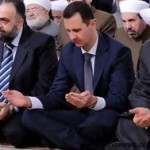
 The war in Syria has entered its fourth year, yet “Human Rights Watch” and its executive director, Kenneth Roth effectively campaign for its prolongation. This article initially published on the AMRIS pages at
The war in Syria has entered its fourth year, yet “Human Rights Watch” and its executive director, Kenneth Roth effectively campaign for its prolongation. This article initially published on the AMRIS pages at 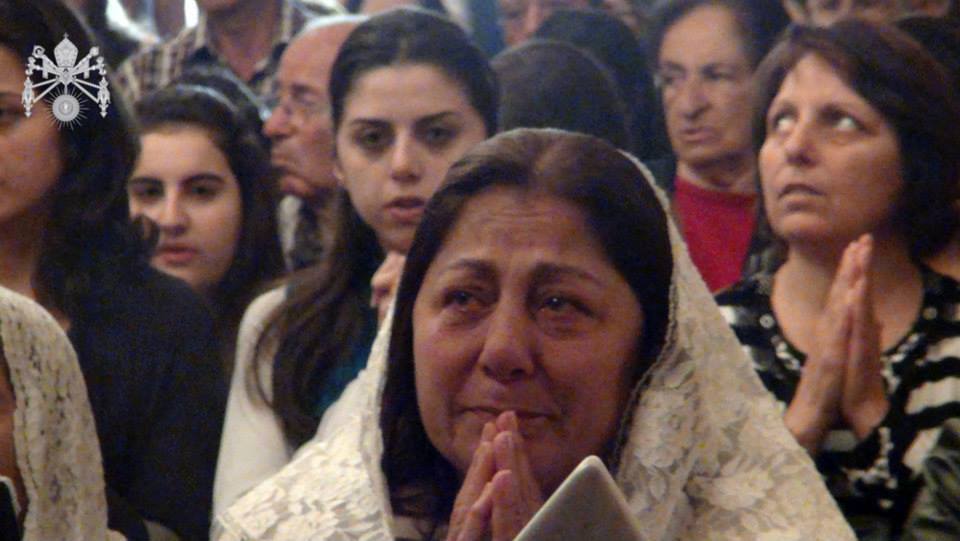
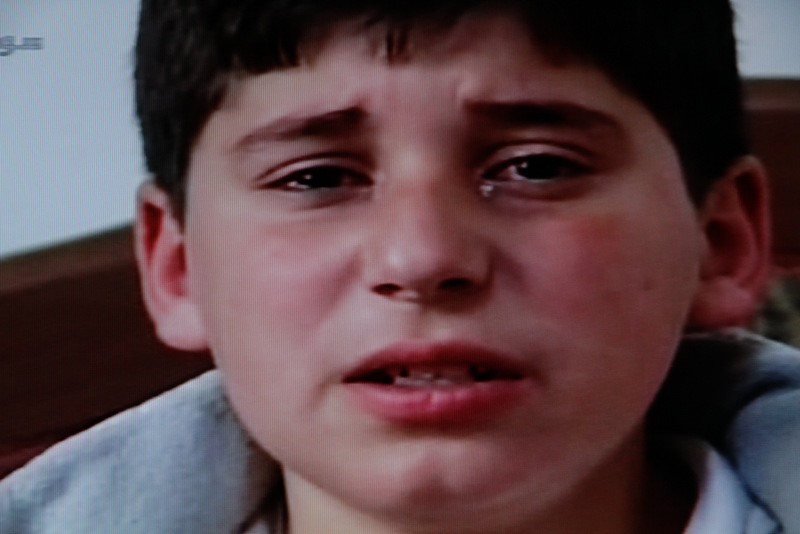

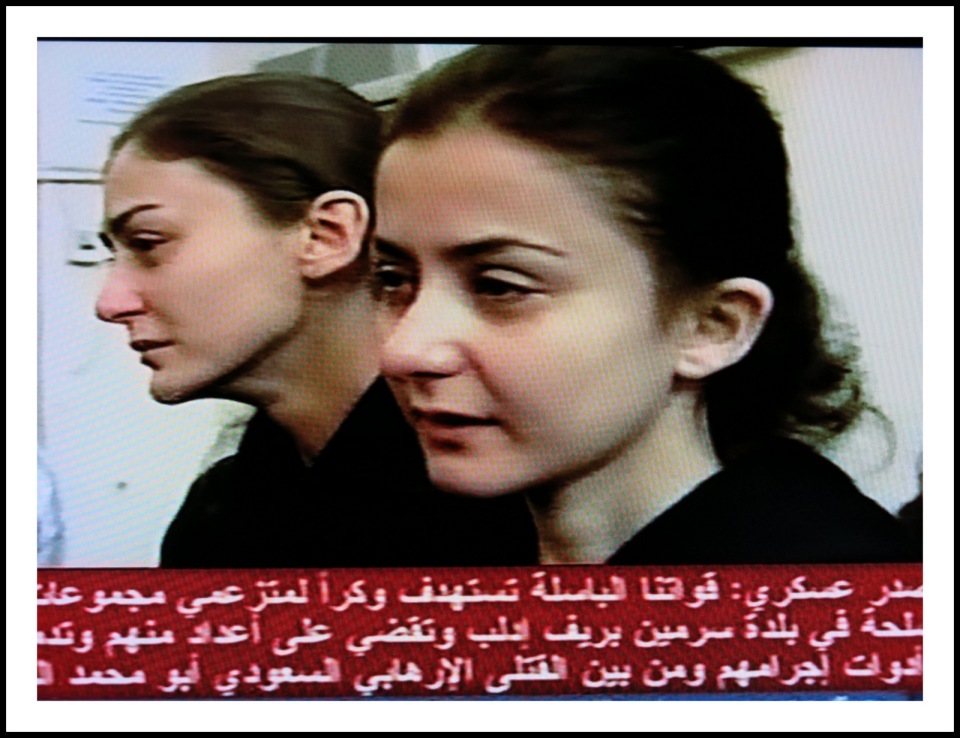

 2. Youtube: A young girl recounts how she was raped by ‘rebels’ her father introduced her to
2. Youtube: A young girl recounts how she was raped by ‘rebels’ her father introduced her to 
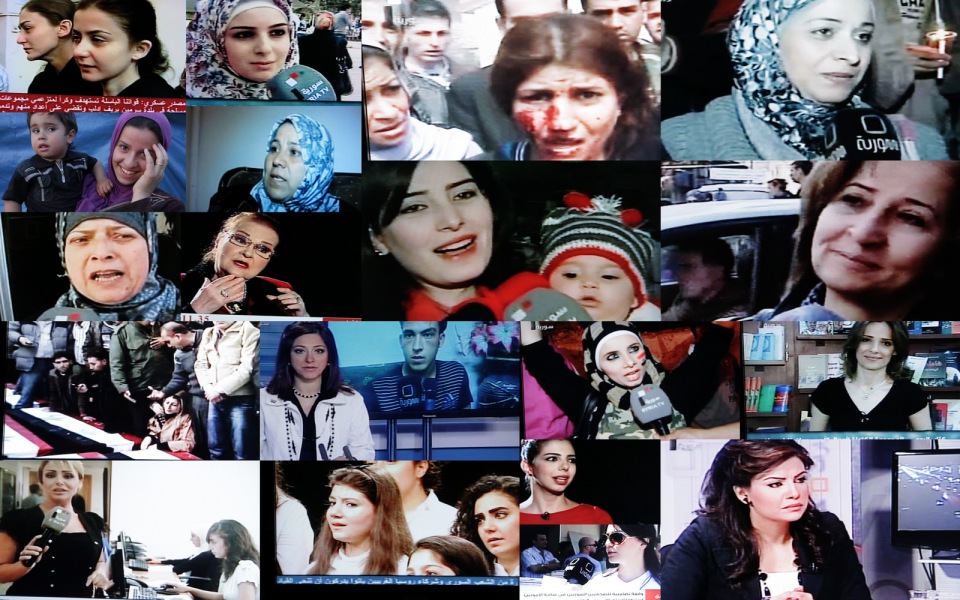
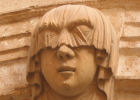 ABC's next "Q and A" on Monday 31st March will have Kenneth Roth, director of Human Rights Watch, as one of its guests. Consider directing questions to the panel, particularly Mr Roth. Since Q and A have a perspective that often screens out non-mainstream views, feel free to post your questions to candobetter.net as well.
ABC's next "Q and A" on Monday 31st March will have Kenneth Roth, director of Human Rights Watch, as one of its guests. Consider directing questions to the panel, particularly Mr Roth. Since Q and A have a perspective that often screens out non-mainstream views, feel free to post your questions to candobetter.net as well.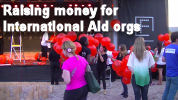 Has capitalism, corporatisation and globalisation corrupted big international aid organisations. Is there some way we can boost the grass-roots activists and reinforce whatever is still working within troubled countries like Syria. And what are we doing there, anyway? AMRIS interview inside.
Has capitalism, corporatisation and globalisation corrupted big international aid organisations. Is there some way we can boost the grass-roots activists and reinforce whatever is still working within troubled countries like Syria. And what are we doing there, anyway? AMRIS interview inside.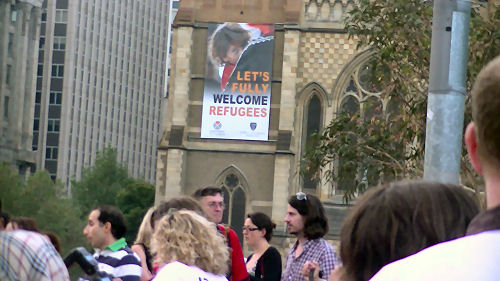
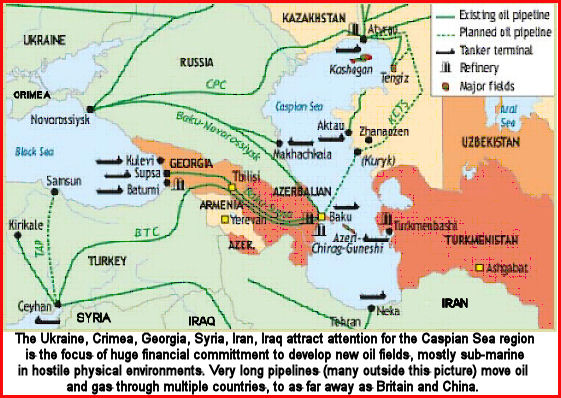
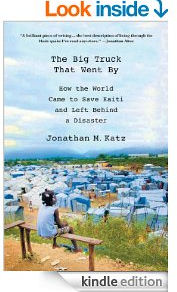
 In Adra, Syria, in parts controlled by the 'rebels', more than 2,500 people have been abducted. No one knows their fate, however, according to reliable reports, scores of women taken hostage are raped and exhibited naked on balconies every day. Children have been thrown from roofs as the army has advanced. Inside we have embedded a video with statements from people who have survived in Adra. The Syrian government may be making some headway, however, against the terror. As reported here in another embedded video, there has been heartening reconciliation and amnesty between 'rebels' and the government in Babbila, Yalda, and Beit Sahem, three country towns in Damascus. Australia should not interfere with Syrian government attempts to restore order. They are Syria's only hope, although you will not hear this in the mainstream news, like the ABC or Murdoch papers.
In Adra, Syria, in parts controlled by the 'rebels', more than 2,500 people have been abducted. No one knows their fate, however, according to reliable reports, scores of women taken hostage are raped and exhibited naked on balconies every day. Children have been thrown from roofs as the army has advanced. Inside we have embedded a video with statements from people who have survived in Adra. The Syrian government may be making some headway, however, against the terror. As reported here in another embedded video, there has been heartening reconciliation and amnesty between 'rebels' and the government in Babbila, Yalda, and Beit Sahem, three country towns in Damascus. Australia should not interfere with Syrian government attempts to restore order. They are Syria's only hope, although you will not hear this in the mainstream news, like the ABC or Murdoch papers. 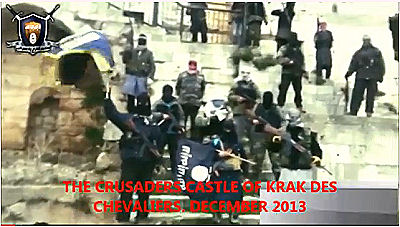

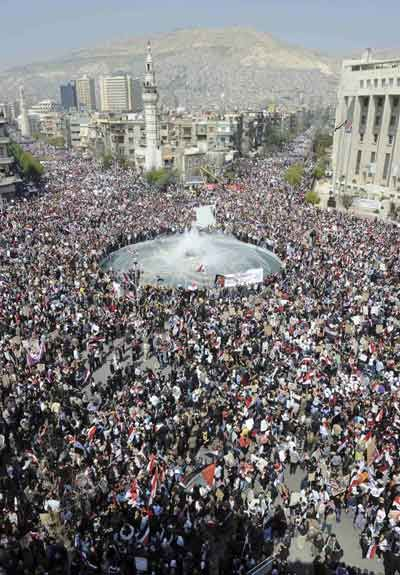
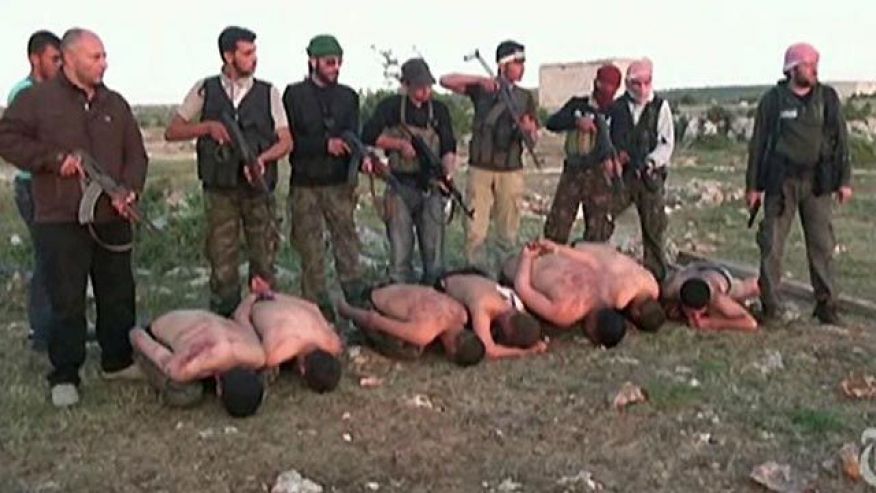
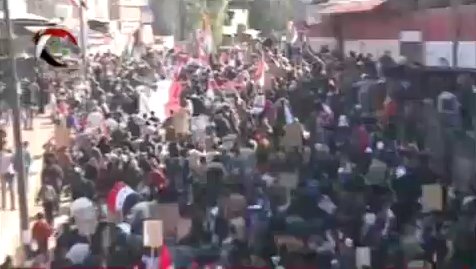
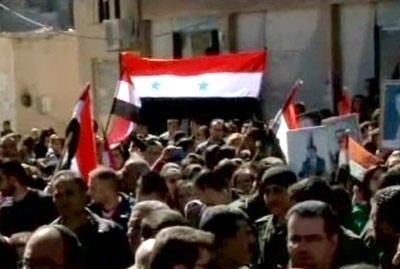

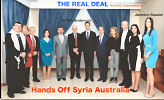 Inside, two interviews with Dr Tim Anderson, Sydney academic, on Syria. The first is by Channel 7 on 24 January 2014 and shows incredible bias. The second is by Journalist Joshua Blakeney, who interviewed Anderson and Hands Off Syria's Jasmine Saadat about their recent visit to Syria where they met with Syrian officials including the President of Syria Bashar al-Assad. The interview was conducted at a time when the pro-war Australian press was attempting to discredit members of Hands Off Syria Australia for meeting with members of the Syrian government. See inside for videos.
Inside, two interviews with Dr Tim Anderson, Sydney academic, on Syria. The first is by Channel 7 on 24 January 2014 and shows incredible bias. The second is by Journalist Joshua Blakeney, who interviewed Anderson and Hands Off Syria's Jasmine Saadat about their recent visit to Syria where they met with Syrian officials including the President of Syria Bashar al-Assad. The interview was conducted at a time when the pro-war Australian press was attempting to discredit members of Hands Off Syria Australia for meeting with members of the Syrian government. See inside for videos.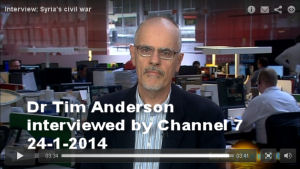



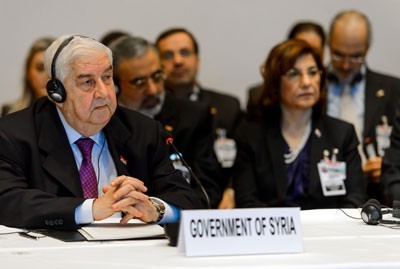
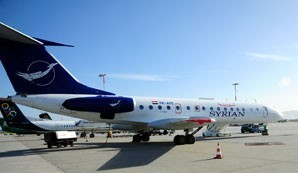
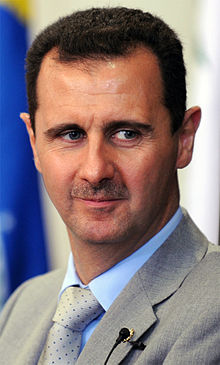
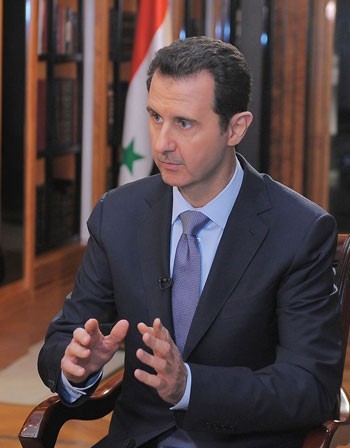



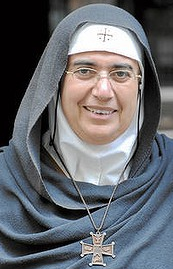
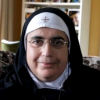 People all over the world have been shocked to discover that
People all over the world have been shocked to discover that 
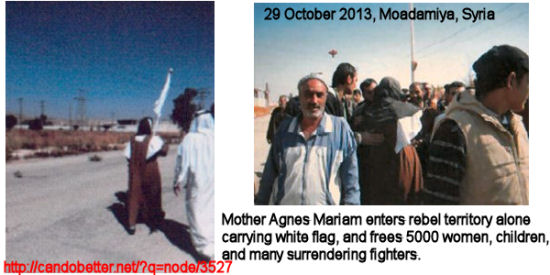
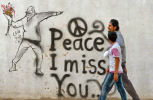 Highlighting the hypocrisy and double standards of Australia's official 'commitment' to the 'war on terror' in Afghanistan, and the celebration of the 'heroic sacrifices' made there by Australian soldiers on Remembrance day, was the appearance in our media of a video clip from Syria the following day.
Highlighting the hypocrisy and double standards of Australia's official 'commitment' to the 'war on terror' in Afghanistan, and the celebration of the 'heroic sacrifices' made there by Australian soldiers on Remembrance day, was the appearance in our media of a video clip from Syria the following day.
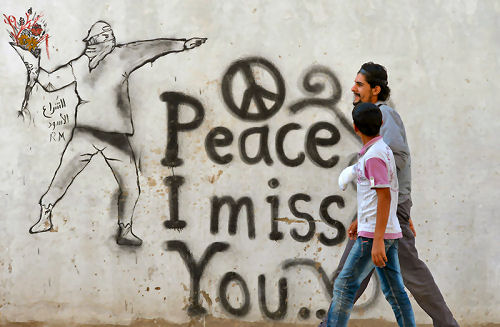 While this man was known to Australian authorities, - allegedly 'Ahmad' from Logan near Brisbane - and belonged to a community there which supports 'the jihad' against the Assad government, his family claims he never went to Syria to fight, and is alive and well and living in Turkey. They also claim that he didn't speak Arabic like the man shown in the video ....
While this man was known to Australian authorities, - allegedly 'Ahmad' from Logan near Brisbane - and belonged to a community there which supports 'the jihad' against the Assad government, his family claims he never went to Syria to fight, and is alive and well and living in Turkey. They also claim that he didn't speak Arabic like the man shown in the video .... 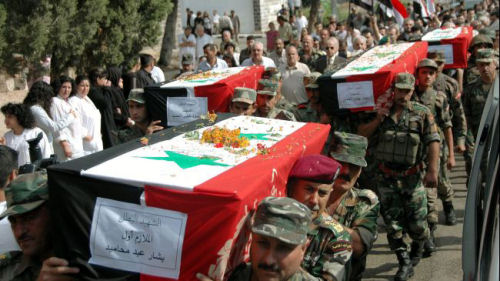
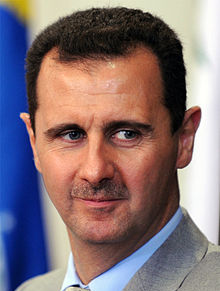 "Friends of Syria" would deny Syrians the right to choose this man to be their President.
"Friends of Syria" would deny Syrians the right to choose this man to be their President.
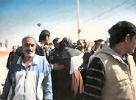 550 men decided to leave Moadamiya and surrender to the Syrian Army. All were taken to a rest house and served with dignity. Then 50 at a time were taken to the frightening Air Force Intelligence headquarters for two hours of discussion and registration. They will spend one more night in the rest house and then the majority will be able to go back to normal civilian life. Those who have perpetrated crimes will be kept in this rest house for a rehabilitation period.
550 men decided to leave Moadamiya and surrender to the Syrian Army. All were taken to a rest house and served with dignity. Then 50 at a time were taken to the frightening Air Force Intelligence headquarters for two hours of discussion and registration. They will spend one more night in the rest house and then the majority will be able to go back to normal civilian life. Those who have perpetrated crimes will be kept in this rest house for a rehabilitation period.
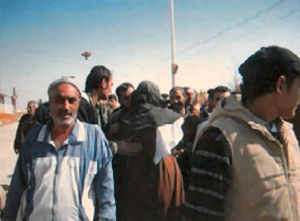
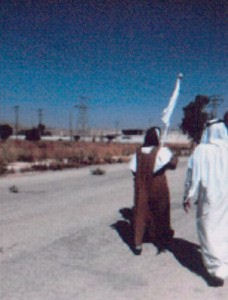 This photo reportedly depicts Mother Agnes proceeding into rebel territory under the anxious eyes of those she has left. She is carrying a white flag. "Despite the entreaties of her team, Agnès-Mariam is producing a white flag and adventure beyond the entrance arch, in rebel territory, a no man’s land known for hiding 12 snipers among the deadliest. Members of the team are watching anxiously for her. Her team follows her. Joined by Sister Carmel and two members of her team, Mother Agnès-Mariam is welcomed by the men of the revolution that came without their weapons. Out of the factory they find themselves with women from Mouaddamiyya waiting for their evacuation."
This photo reportedly depicts Mother Agnes proceeding into rebel territory under the anxious eyes of those she has left. She is carrying a white flag. "Despite the entreaties of her team, Agnès-Mariam is producing a white flag and adventure beyond the entrance arch, in rebel territory, a no man’s land known for hiding 12 snipers among the deadliest. Members of the team are watching anxiously for her. Her team follows her. Joined by Sister Carmel and two members of her team, Mother Agnès-Mariam is welcomed by the men of the revolution that came without their weapons. Out of the factory they find themselves with women from Mouaddamiyya waiting for their evacuation."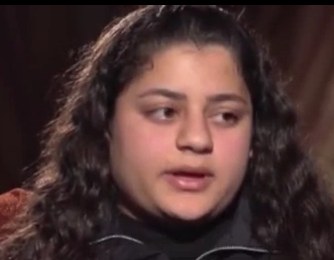
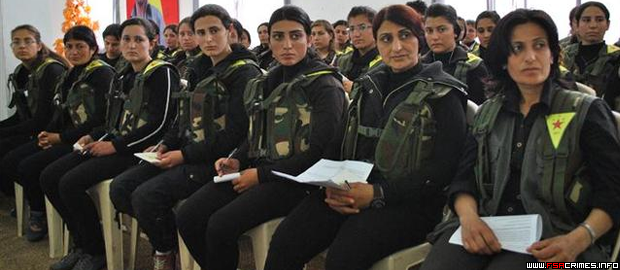
Recent comments